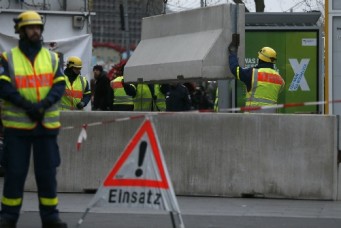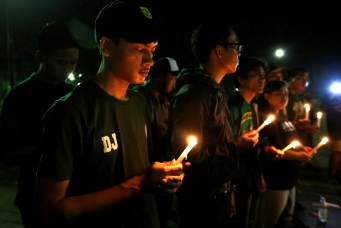Egypt’s War On Terrorism
Even as the United States works with Egypt to counter violent threats in Sinai, relations will remain tense because of Egypt’s insistence that political dissent be considered terrorism.

Over the past month, the United States and Egyptian governments have attempted to overcome the tensions that have characterized their bilateral relations since the July 2013 coup by refocusing the U.S.-Egypt relationship on urgent mutual interests: counterterrorism first among them. Although this makes sense, tension persists because the two sides define “terrorism” differently. Even as the United States works with Egypt to counter violent threats in Sinai and its other border regions, the overall relationship will remain tenuous—and aid and assistance are unlikely to flow freely—because of the Egyptian government’s insistence that political dissent be considered terrorism as well.
Egypt faces a real and serious terror threat in and from its Sinai Peninsula, and countering this threat is indeed a mutual security priority. According to the Egyptian government, over 700 soldiers, police, and civilians have been killed in terrorist attacks since the 2011 uprising: about 500 of them just since the July 2013 coup. The majority of these casualties have been in Sinai or at the hand of Sinai-based actors. Most of the near-daily roadside bombs and targeted shooting of security service vehicles go unclaimed; it is usually only the spectacular mass-casualty events for which terrorists seek recognition. The most active group that claims responsibility for such attacks is Ansar Bayt al-Maqdis, or “Supporters of Jerusalem,” also the only Sinai-based group to claim responsibility for attacks outside of the peninsula.
Although the name “Supporters of Jerusalem” paints a target on Israel, in fewer than three years since its formation in early 2011 the group has morphed from attacking Israel and attempting to disrupt Egypt-Israel relations to an almost exclusive focus on its war against the Egyptian army—especially since summer 2013. It has taken credit for attacks from rocket strikes against Israel to bombings in North and South Sinai, an assassination attempt on the Egyptian Interior Minister Mohammed Ibrahim on September 5, and attacks on security headquarters and police in Cairo, Dakahliya, Ismailiya and Sharqiya governorates. The groupshot down an Egyptian army helicopter on January 25, 2014 in Sinai with a man-portable air-defense system (MANPADS), and on February 16, they carried out a suicide attack against a tour bus of Korean pilgrims in Taba, the first targeted attack on tourists since the 2011 uprising.
Despite its aspirations and support for al-Qaeda’s ideology, Ansar Bayt al-Maqdis has no formal ties to al-Qaeda, and the Sinai-based group does not project an immediate threat to U.S. security. However, as a jihadi group based in the borderlands between two U.S. allies, striking out at both, Ansar Bayt al-Maqdis stands as a direct threat to three U.S. national security interests: Egyptian stability, Israeli security, and the maintenance of a quiet border between the two. The U.S. Department of State designated Ansar Bayt al-Maqdis a foreign terrorist organization on April 9, 2014.
Over past few months, Egyptian armed forces have been more successful on countering the Sinai threat by clamping down on the peninsula. When Ansar Bayt al-Maqdis carried out the MANPADS attack and, soon after, the tourist attack, it seemed as if there was no stopping their momentum. These attacks, however, concentrated the attention of the Egyptian armed forces. The Egyptian government’s insistence that the Muslim Brotherhood is behind Ansar Bayt al-Maqdis attacks resulted in the security forces focusing on the former group more than the latter. However, in the weeks following the helicopter attack, the Egyptian militarypounded suspected jihadist safe havens outside the North Sinai cities of al-Arish, Rafah, and Sheikh Zuweid using Apache helicopters. In kinetic terms, the use of helicopters in these operations was the most effective—and indiscriminate—way to take on the jihadis; but it was also a clear signal that one MANPADS attack had not hindered the military’s operational advantage of superior firepower.
Even while U.S. aid was suspended between October and April due to harsh crackdowns on the Muslim Brotherhood and other political activists, the Egyptian military went on the offensive in Sinai. Egypt prefers not to publicize its cooperation with Israel, but the two neighbors have coordinated Egyptian military operations in Sinai since 2011. United States officials also regularly speak with their Egyptian counterparts about addressing the Sinai threat. Egyptian operations in Sinai are an American interest too, and the U.S. government took notice of the stepped-up Egyptian efforts. State Department officials cited such operations—as well as the recognition of the mutual threat from Ansar Bayt al-Maqdis—in announcing the April decision to release ten new Apache helicopters to Egypt.
As the armed forces and police focus on Sinai’s terror threat, more so than at any other time since the 2011 uprising, the peninsula has quieted down significantly, at least for the moment. At the same time, while the armed forces have successfully curbed big, Sinai-linked attacks, there have been a growing number of smaller attacks—completely unconnected to Sinai groups—on police patrols, checkpoints, and individuals in Egypt’s urban centers. These attacks are carried out in retaliation for perceived police abuses since Morsi’s ouster. Such attacks are also acts of terrorism, and such violence can never be condoned or excused; but from the perspective of the United States, Egypt’s current political conflict—and the crackdown on peaceful political dissent—is exacerbating terrorist threats to the mainland.
The U.S. government sees many interim Egyptian government policies and judicial rulings as dangerous. While agreeing that Morsi was not a very effective or inclusive president, Washington just is not buying the Egyptian narrative that his Muslim Brotherhood organization is behind all the terrorism in Egypt. As the State Department’s recently released Country Reports on Terrorism for 2013 notes, the Egyptian government “did not provide any substantiating evidence that the MB was directly involved in the terrorist attacks that followed President Mohamed Morsy’s removal.” Indeed, U.S. officials are tired of hearing this talking point from their Egyptian counterparts instead of focusing on real terrorist threats from Sinai and Libya.
Indeed, by expanding its “war on terror” to a “war on political dissent,” Egypt is losing U.S. support for counterterrorism in mainland Egypt. In material terms, the U.S. government is reluctant to provide tools meant to help combat terrorism for fear that they would be used to target political opposition as well. The upshot is that counterterrorism cooperation between Egypt and the United States on Sinai, though perhaps hampered by current disagreements, can and will likely continue whether or not Egypt moves in a democratic direction, as security in the peninsula is a mutual interest. However, U.S. assistance to Egypt to address terrorism will be greatly enhanced if Egyptian authorities ease up on the political opposition.
This article is reprinted with permission from Sada. It can be accessed online at:http://carnegieendowment.org/sada/2014/05/22/egypt-s-war-on-terrorism/hbdq
Zack Gold, a Washington-based analyst, is author of the International Centre for Counter-Terrorism–The Hague research paper “Security in the Sinai: Present and Future.”




